Beekeeping is one of those things that utterly fascinates me, but I haven’t added any bees to my homestead… YET. In the meantime, I love learning from homestead beekeepers such as Amy from The Vomiting Chicken. Not only are bees a wonderful addition to a homestead of any size, keeping bees has much greater importance than just providing you with raw honey. Read on for details!
They’re dying by the millions.
Since 2006 honeybees responsible for pollinating more than 100 crops—from apples to zucchini—have been dying by the millions. Though there have been news reports of this crisis, most people still aren’t aware of it. It’s a complex problem, and experts haven’t agreed on the primary reason for it: Colony Collapse Disorder, other diseases, and two kinds of mites are killing entire colonies, but they don’t understand exactly why.
Here’s a scary fact for you: Researchers have found that a combination of common pesticides can interfere with bees’ brains. Bees that cannot learn, will not be able to find food. If bees can’t find food, they will die. Simple as that.
An estimated third of all crops worldwide would disappear, if honeybees disappeared. Think this couldn’t happen? Probably nobody believed that the passenger pigeon would ever be extinct, but the last one on earth was shot exactly a hundred years ago.
The point is, it could happen. But here’s the thing: we can do something about it, though we need to act quickly. There are things we can do to help the honeybees survive. Here’s one: you can get started with your own hive of honeybees.
We keep three hives going, though it has become difficult to keep the bees alive and healthy. We love the honey and I use it every day, in one delicious form or another. We lost all of our bees this winter, so my husband Bryan and our little Mack recently installed new packages of bees into our hives.
I’m glad that scientists are studying this problem, and that folks are educating themselves about what flowers and plants they can grow to support the honeybees. It’s a good thing that there is increased interest in buying local honey, which helps support the local beekeepers. All the attention is good. I’ve always delighted in cheering for the underdog, and I’m cheering for the honeybees.
A hive of honeybees on a homestead is valuable thing these days. Not only do honeybees produce the sweet miracle that is raw honey, they also do a beautiful job of pollinating berry bushes, orchards, flowers, and vegetable gardens, and (this last reason appeals to me more and more) they do it all without much help from us.
Bees are astonishing little creatures, and the more I learn about them, the more I am in awe of them and their imaginative and wondrous Creator!
Consider:
- Inside one hive are thousands of worker bees, drones and a queen bee, all working together to create the perfect environment for producing honey. When the moisture content of the honey is perfect, the bees seal the cells of liquid honey with wax, and the honey is ready to be harvested! Sweet!
- There is only one Queen Bee in every colony. She lays up to 2000 eggs per day, and she can choose whether the eggs will be fertile (becoming worker bees) or infertile (becoming drones).
- The worker bees literally work themselves to death, but during their lifetimes (about 6 weeks during summer months) they do a series of specific chores: housekeeper, nursemaid, construction worker, undertaker, guard, and finally forager.
It’s not difficult to get started with a hive of bees in your own backyard. And it is the perfect way to take a first-hand approach in saving the bees!
8 Steps to Getting Started with Your Own Hive
1. First, educate yourself. There are many excellent books and websites about how to keep bees. Here’s a website I really like, that goes into detail. Another invaluable way to learn is to get to know your local beekeepers. They are a generous lot, and you’ll learn lots from them.
2. Gather your hive and equipment. It’s not cheap to buy new hives and equipment, but use caution if you pick up used stuff at a yard sale. Clean it up well. Here’s a blog that explains how to do this. It’s important to do this, to lessen the chance that your bees might catch a fatal disease called foul brood.
Equipment you’ll need: a bee veil and/or jacket, leather gloves, a frame lifter, bee brush, pliars, a smoker, and hive tools.
Note:Before opening up the hives, it’s important to have your smoker smoldering. If the bees get upset, the smoke will help keep the bees from acting in an upset manner: i.e. stinging you.
3. Order your bees. Order bees in the winter, and most places that sell bees will sell out. There are only so many bees to go around! Packages of bees can be ordered through local bee shops. If you don’t know where one is in your area, your state university or extension office can advise you.
4. Set up your hive. Once you’ve done your homework, you’ll know the best spot to set up your hive. Choose carefully, because it will stay there for a good long time! It’s not easy (or advisable!) to move a hive, once it’s full of bees.
5. Introduce the bees to their hive. Check to see that your queen is alive and healthy first, because a hive without a queen will fail. Your queen goes in first.
The queen’s 10,000+ friends-and-relations get dumped in next. They check on her first, before getting to work. It’s a pretty cool thing to watch.
6. Put the top back on the hive, and pray for the best. Now you’ll watch, and wait: if the bees are happy and healthy, you may have the pleasure of enjoying a productive hive of honeybees for years to come, providing you with the best quality, freshest raw honey you can imagine, and excellent pollination for your crops and flowers.
7. Feed the bees. Set out a sugar water solution in the first days after setting up a hive, especially if it’s early in the season and there aren’t many flowers yet. When you notice that the bees are no longer feeding on the sugar, discontinue feeding them. The bees are feeding themselves!
8. Check on your bees periodically. Open up your new hive every week or two to check on the bees’ progress. One of the things Bryan looks for is new brood. If the queen is laying eggs, then he knows that she is content in her new home. And if Mama Bee is happy, everybody’s happy!
Pretty cool, eh? So you can see that keeping your own hive of bees is a crazy-worthwhile thing to do: it increases your local bee population, and it is a valuable component to the fruitfulness of your gardens. Plus, you’re doing your little bit to help the honeybees in this current crisis.
It’s just a great thing to do!
Note from Jill: If, for now, you’re just looking for the perfect source for delicious, amazing raw honey (and you don’t have your own bees), this is my favorite source. Their tupelo honey is beyond YUM.
Amy Young Miller keeps a small orchard, a large garden, lots of chickens, a few smart-alec children, some berry brambles, lots of flowers, and three hives of honeybees, on a few windy acres in Nebraska. She writes about her adventures at http://vomitingchicken.com, and you can also find her on Facebook and Twitter.
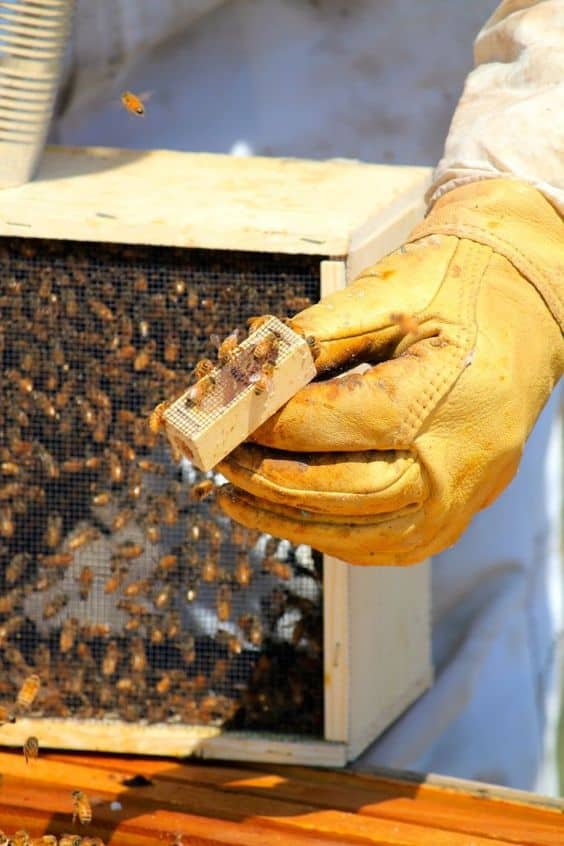
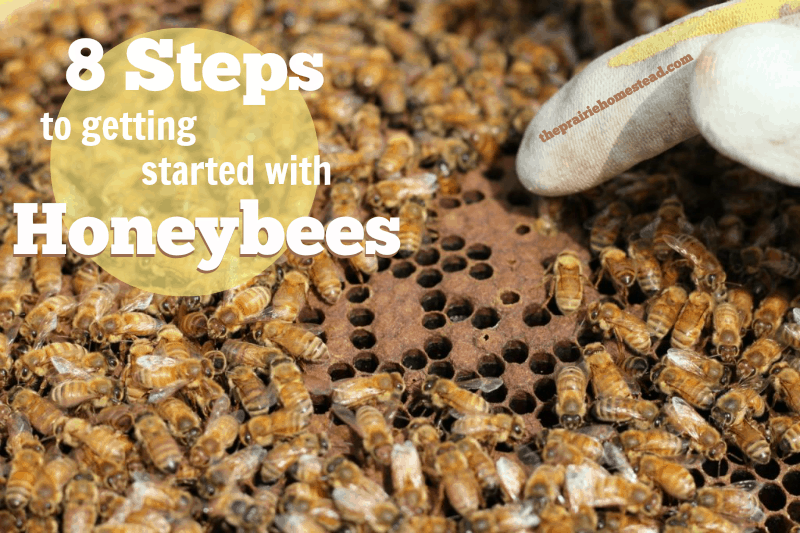

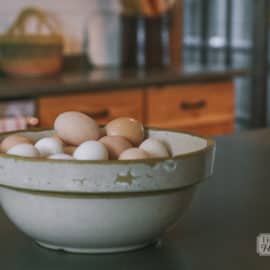
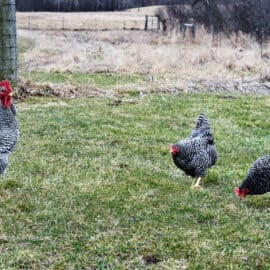
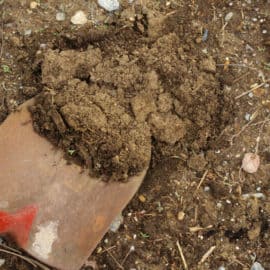

I am very excited to get a hive or two going. I’ve always wanted to keep bees and have been educating myself on it but there’s nothing like participating in honey extraction! A friend of ours has several hives and invited us to help. What an experience and definitely the kicker to say, LET’S DO IT! I will be saving this post, for sure!
Thanks Jill. This looks awesome. *big sticky kiss* Blessings!
There is an excellent book called Natural Beekeeping, Organic Approaches to Modern Apiculture, by Ross Conrad, from Vermont. Mr. Conrad gives several ways to work with the naturalness of bees to increase their survival. He now enjoys 80, 90 even 100% overwinter survival rate on his 70 plus hives, and has been working with bees since the mid-90’s I think. I attended a talk to beekeepers in our state of Missouri when he was here this past winter, on the use of products of the hive for health purposes. Very intriguing subject, catogorized in general as apitherapy–which isn’t just the use of bee venom, but also pollen, wax, propolis, and royal jelly. All the latter can be found in honeycomb, which in Proverbs 16:24 is said to be ‘health to the bones’! One encouragement from Mr. Conrad: He states that if you keep bees you will loose/kill them at some point. It is part of the learning curve and he encourages folks to jump in and spend lots of time getting to know their bees; as its the only way to become a better keeper.
Thanks for this, Glenda. One thing I’ve discovered . . . you never stop learning, especially about bees! My husband and I learn new things about them every season. I’ll definitely look for that book. It sounds awesome!
Hi there!
Thanks for sending out such good info on honeybees! My son and I have been tending my Dad’s hives for the past 2 years since he passed away at 94…just 2 weeks after collecting his last swarm of bees. My son is a natural and I’m his “helper”.
A very good source of help and info is your local beekeeping association. We have a group of folks that have had bees for years and years and have been an awesome resource. The best place to get your bees is also from your local association. Too often those you buy have been so stressed out in their travel that they just don’t always do well in the transition. So buy local when you can…and then get ready for some sweet harvesting! Our girls are going gangbusters here in VA with all the pollen and already have many pounds of honey waiting to share… 😉
Happy Beekeeping!
~Melissa
Last year we started keeping bees. I tried the link to the website you recommended but it says Page was not Found. It was under #1 on 8 Steps to Getting Started with Your Own Hive
Would you please send me the link?
Whoops! here ya go: http://www.dummies.com/how-to/content/the-essentials-of-setting-up-a-backyard-beehive.html
Thank you so much! I want to know as much as possible about beekeeping!
Beekeeping is so interesting. Even after loosing all three of our hives due to the weather, we looked forward to getting a package of bee to begin again. We feel a bit addicted to having raw honey available at all times.
Sitting and watching the bees come and go is a great way to relax too.
Hi Amy,
We have had bees for several years now and have been catching local swarms. In fact, one our hives just swarmed today, and moved right into the hive next to it that had been abandoned over the winter. We had 6 healthy hives, and this winter 4 of them disappeared, no dead bees anywhere, just empty hives (except for the honey they left behind). Then this spring one of the remaining 2 died. But like I said, the one that was left swarmed today. Do you know why bees would leave in the winter? Thanks, and keep up the good work.
Nicole,
You’re certainly lucky to have one of your hives simply move next door! As far as the empty hives are concerned: that sounds like Colony Collapse Disorder to me. There’s lots about it on the web. Here’s one article: http://en.wikipedia.org/wiki/Colony_collapse_disorder
I want very much to keep bees, but I am terrified of getting stung.
Christina, I can understand that fear! But I can assure you that if you educate yourself on when to work with the bees and when to leave them alone (believe it or not, they are grumpier on windy or dark days), and wear the appropriate bee gear (bee veil and long-sleeved jacket and leather gloves) the chances of your getting stung are pretty remote. The last time I was stung was probably 20 years ago: I went into the backyard one day and walked right in front of the beehives, very close to them (a no-no) and I had hairspray on (also a no-no) and I had a couple of bees sting me on the head. But it is very rare for beekeepers to get stung, because they know how to work with the bees.
Thanks for the info on bees. Any suggestions for my situation are most appreciated. We have bees in our walls. When we bought our old farmhouse last October, we found a hive buzzing between the siding and the inside walls. The previous owners said the hive has been there for a long time. The hive is going strong this spring, but we are having new siding installed in a few weeks.
I want to keep the bees (and have most of the needed equipment as well as a beekeeping course under my belt). We belong to the local beekeeping association, but are a little shy of asking for assistance since we just joined. It is a huge association and we are overwhelmed with it, to tell you the truth. I did speak with a couple members who gave some advice about moving the hive a couple miles away to prevent them from returning to the old hive. However, the bees won’t be able to return because the siding will be changed and the entrance repaired so they can’t return. And anyway, moving the hive miles away is not an option for us.
I’ve watched a few videos about removing hives from walls, so I think it can be done, however, I would be so grateful if anyone has any suggestions. Thank you in advance!
Gretchen, you are so lucky! I remember years and years ago, when bees were found in a house, the usual course was to smoke them out or to kill them. I’m so glad that that isn’t the way it’s done today! Bees are just too highly-valued these days, as they should be!
It sounds like you’ve done your homework and you already know what to do. If I were you, I would contact other beekeepers and ask for help. If your beekeeper’s organization is a big one, surely there are plenty of volunteers who’d jump at the chance to help you save the swarm. I’d move it into a hive and just hope for the best, and pat yourself on the back afterwards for doing such a gutsy (and smart!!) thing!
I’d sure like to hear what happened. Could you send me an e-mail afterwards? Blessings!
I’ll let you know how it goes!
Thanks for the detailed information – out of curiosity, do you know if there are any laws on file for having a hive in a neighborhood? There seems to be a law for everything – and I an see someone suing after a bee sting!
Lucy,
That thought has occurred to me, too, although we’ve nearly always had bees in our backyard–in two different towns, and the country–and I’ve never had any trouble with it. I guess you’d have to just ask around in your area to see if such laws are on the books. Or just put a hive in and plead ignorance . . . . 😉
I saw you said that your bee’s died this winter. What caused them to die? what makes it hard for them to stay healthy?
Amy, I think you made a mistake when you stated that the queen can choose the sex of the bee. That part is true. But it is female (worker) bees who are sterile. If they weren’t they would be laying eggs, too, and the poor queen bee would be unemployed. The drones (male) are fertile; otherwise, how would the queen have any eggs to lay? The drones are useless other than for fertilization. (I am now picturing my ex-husband). The females feed and tend them, as they do the queen. The queen can also create a new queen, by feeding the embryo royal jelly. And royal jelly is really good for you!
On other posts I’ve read, it talks about medicating bee’s. How can one have a hive without medicating them, and what are some natural remedies to use in place of the medications a bee might need? Thanks
You need to look at how to keep bees organically or treatment free. Bees do not have to be medicated. I have over 100 hives and do not medicate. Good nutrition is key!
My Aunt had been doing some cleaning and came across a couple of boxes that had been packed away and forgotten after my grandfather had passed away. I was quite surprised to be gifted a gallon of beautiful dark honey. I never knew my Grandfather kept honey bees on his homestead. It meant so much to me. My husband & I are starting our own homesteading journey and hope to have bees soon. Your site is lovely & full of helpful info.
Thank you so very much for all this great information.
It is so helpful being a new beekeepers
Mickey
Really i am impressed from this post. I really admire the valuable information on honeybees you have been able to share us through this post.
I would really like to keep bees but as long as we have Monsanto out there the bees will continue to die by the millions
Thank you for such an interesting blog. I am enjoying every post.
CAN YOU PLEASE SING ME UP FOR YOUR NEWSLETTERS.
I’m a second year bee keeper
I had 2 hive last year n one swarmed i put 5 new nucs
Out thise year n lost one in days
Not one bee left that hive
I’m trying learn how yous
Oils for health bee’s
I just got lemongrass speremint teetree winter green oils do i need more?